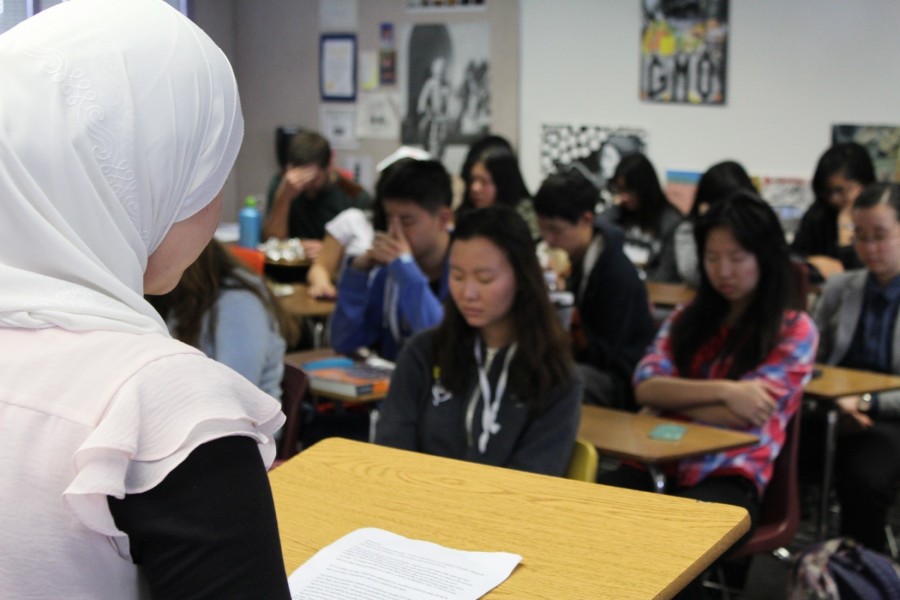Sending a silent message for peace
Noor Naji, president of MSA, opens the club’s “Silence For Syria” campaign follow-up with an activity urging students to sympathize with Syrian refugees.
February 24, 2016
Attempting to push past misconceptions against Muslims in light of the controversies surrounding the terrorist group ISIS, Diamond Bar High School’s Muslim Student Association held a day of silence for Syria on Feb. 12.
Students who chose to participate covered their mouth with duct tape or simply stayed quiet for varying durations—all day or during certain periods. The act wasn’t a political statement, as the event was for humanitarian reasons.
“The media really just distorts the image of Muslims, so we just hope that people can see that we’re also human. We could adjust in environments and we’re also a part of society,” said Batol Naji, MSA secretary. “We all want to help, we don’t want to look at the differences because we all have differences, but America is diverse and we want to contribute to the society.”
In MSA, there are a few students with relatives currently residing in Syria, or who have even grown up in Syria themselves.
The event was initially meant to give the members a voice to clarify misconceptions about Syria and Syrians.
“A lot of people who speak of Syria and the Syrian refugees haven’t even been there before and some of our members spent their childhood growing up there. The Syria being represented in the media isn’t the Syria they know or remember. We want to give them an outlet to express that.” co-club adviser Lauren Osajima-Baird said.
In addition, MSA sold wristbands with “Silence for Syria” on them the day prior to the event for $2 each to help fund a refugee school in Lebanon.
That same day, the club watched a video in Osajima-Baird’s room during lunch, illustrating the Syrian crisis.
“It was shocking for me to see what Syria looked like before all the rubble. It’s just rubble now, and it was so beautiful, but now it’s something you don’t recognize,” Osajima-Baird said.
The subsequent week, MSA held a follow up for “Silence for Syria” campaign.
Following a video about Syrian refugees, guest speaker Hanadi Elwan, a Syrian activist for organizations such as the Syrian American Council and the Sunrise Foundation, retold her experiences on visiting Syrian refugee camps.
“I saw children with shoes of different sizes and moms crying, and it was terrible. For a second, I stepped back and I thought [that] we have to do something to improve their lives in the camps. There are still horrible events going in Syria, but they have hope, and the hope is you, me, my children, and the future generations who can help ease their sufferings,” Elwan said.
The club has held events in the past, including “Ask a Muslim” last semester, when guest speakers Furhan Zubairi, the Imam at a local mosque, and Thomas Alameddine, a teacher at Institute of Knowledge, held an discussion on terrorism and Islam.
“Ask a Female Muslim” was a separate event that featured Muslim women speaking about the difficulties and their feelings of wearing hijabs. Students of various religions also partook in the experience by wearing a hijab for the day.
Although the club has existed for more than a decade, it changed every year, according to Osajima-Baird. Instead of just providing a place to pray and gather, the club is more open and focuses on bringing light to false ideas people may have of the Islam religion.
“Instead of being blind to the feelings of our own humanity when we aren’t aware of the sufferings, we chose to humanify and understand them. We’re all people and we believe in doing something to connect to people as people. That’s what makes us human, it’s recognizing the humanity in everyone,” adviser Tony Tietz said.




